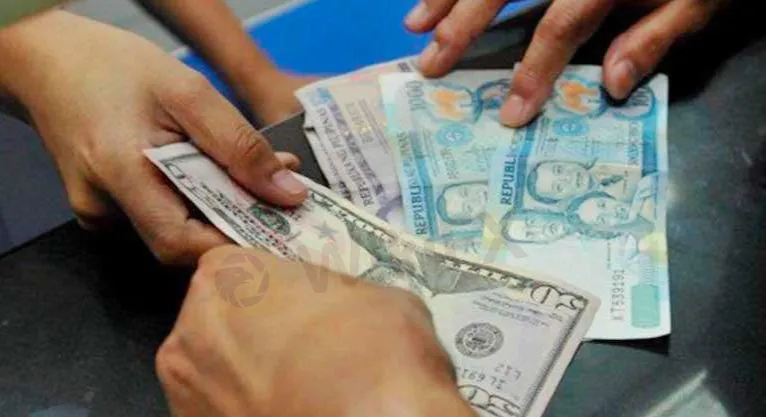简体中文
繁體中文
English
Pусский
日本語
ภาษาไทย
Tiếng Việt
Bahasa Indonesia
Español
हिन्दी
Filippiiniläinen
Français
Deutsch
Português
Türkçe
한국어
العربية
Peso drops further on new coronavirus variant
Abstract:PESO weakened against the dollar
THE PESO weakened against the dollar on Friday after a new coronavirus variant led to risk aversion among investors.
The local unit closed at P50.43 versus the dollar, down by four centavos from its P50.39 finish on Thursday, data from the Bankers Association of the Philippines showed.
The peso opened Fridays session at P50.40 per dollar. Its worst showing for was at P50.57, while its intraday best was at P50.32 against the greenback.
Dollars traded rose to $1.15 billion on Friday from $1.1206 billion a day earlier.
Michael L. Ricafort, chief economist at Rizal Commercial Banking Corp., said the peso ended slightly weaker against the dollar after a new coronavirus disease 2019 (COVID-19) variant detected in South Africa triggered profit-taking and risk aversion in global financial markets.
South Africas health minister had announced the detection of the new variant, which scientists said had a high number of mutations.
“Peso (was) also weaker after the net foreign portfolio investments outflow in October 2021 was the biggest in three months,” he said in a Viber message.
More short-term foreign investments exited than entered the Philippines in October amid lingering inflation concerns among investors.
Foreign portfolio investments — commonly referred to as “hot money” due to the ease by which these flows enter or leave an economy — posted a net outflow of $221.11 million in October, based on data released by the Bangko Sentral ng Pilipinas (BSP) on Thursday.
The October figure is 55% lower than the net outflow of $493.46 million a year earlier and more than nine times higher than the net $24.16 million that left the country in September. It was also the biggest outflow since the $339.7 million posted in July.
In the first ten months, hot money yielded a net outflow of $679.64 million, which was 83% lower than the net $3.9 billion that exited the country in the same period in 2020.
UnionBank of the Philippines, Inc. Chief Economist Ruben Carlo O. Asuncion said investors preferred safe-haven currencies.
“The new COVID-19 variant has rattled the markets and the market in a knee-jerk reaction is in a sell-off,”he said in a Viber message. “With this, particularly for forex, the movement is away from Asian currencies to more safe-havens like the USD.”


Disclaimer:
The views in this article only represent the author's personal views, and do not constitute investment advice on this platform. This platform does not guarantee the accuracy, completeness and timeliness of the information in the article, and will not be liable for any loss caused by the use of or reliance on the information in the article.
Read more

FBS Joins Two Prestigious Financial Events by the End of 2024
FBS is thrilled to announce our participation in two major financial events in Asia – iFX Expo Asia 2024 and Traders Fair Davao!

FBS IB Program Named the Best Globally
The FBS Partnership Program earned the title of the Best Introducing Broker Programme 2024 from the World Finance Awards.

FBS Ranked Among Top 5 Best Brokers by FXStreet
FBS has been recognized as one of the best Forex brokers in 2024 by FXStreet!

FBS Increases Leverage on U.S. Indices to 1:500
FBS is excited to announce a significant update in trading conditions for our clients: starting from August 5th, 2024, the leverage on major U.S. indices, including US30, US100, and US500, is increased from 1:200 to 1:500.
WikiFX Broker
Latest News
Macro Markets: Is It Worth Your Investment?
Trading is an Endless Journey
What Impact Does Japan’s Positive Output Gap Have on the Yen?
RM62k Lost Investment Scam After Joining XRP Community Malaysia on Telegram
Victims of Financial Fraud in France Suffer Annual Losses of at Least €500 Million
SEC Warns on Advance Fee Loan Scams in the Philippines
Russia Turns to Bitcoin for International Trade Amid Sanctions
Rs. 20 Crore Cash, Hawala Network, Income Tax Raid in India
Hong Kong Stablecoins Bill Boosts Crypto Investments
BEWARE! Scammers are not afraid to impersonate the authorities- France’s AMF said
Currency Calculator


